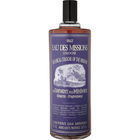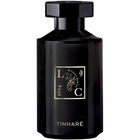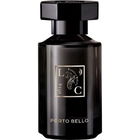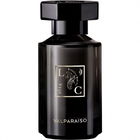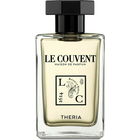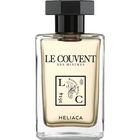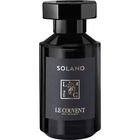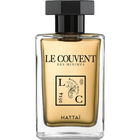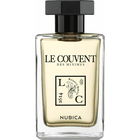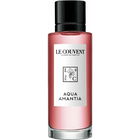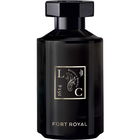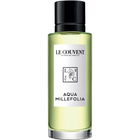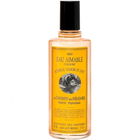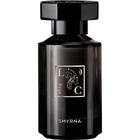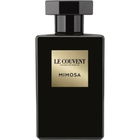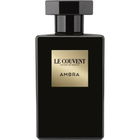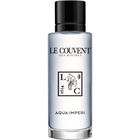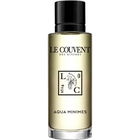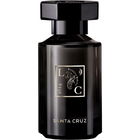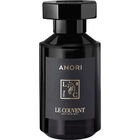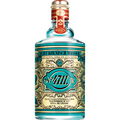The world of perfumes can be very cruel and very fast-paced, and so it happens that this wonderfully graceful scent, the one with which this brand once launched its offerings, is only ten years old but already feels more distant than the world of medieval monasteries.
"Le Couvent," meaning "the convent" (a word that is colorful in its meaning but usually refers to the residence or assembly house of monks or nuns in a monastery, or the monastery itself), is a French brand that meandered along from 2010 to 2017, releasing about one fragrance per year. All the fragrances had a bit of a monastery vibe: simple bottles, aged labels, and monastic and Christian names like Mission Water (for an oriental-gourmand scent) or Matutin Water, or indeed Paulaner Water (this one). Of course, that was already a facade back then, but with such beautiful scents as these, I gladly drape the cloak of Christian charity over it. I am not familiar with brochures or online presences of this old convent, but they were probably written in Carolingian minuscule.
In 2018, for reasons unknown to me, there was a sharp break: all fragrances released until then were discontinued, and instead, nearly thirty new ones were launched in three series within just three years. The design of the bottles is now trendy, Mr. Ellena serves as the olfactory director of a large perfumer team, and the Christian references in the (new) fragrance names and in the company saga have been minimized. The new convent now interprets itself this way: the brand is dedicated to the memory of a French world traveler and botanist who lived near Le Couvent des Minimes (or near the Paulaner convent, it is not entirely clear whether a village is named after the historical monastery that still stands today). All clear. I actually prefer a fake-monastery brand to such religiously overly correct year-end greetings. Ah yes, I have not found out which corporation (at least today) is behind Le Couvent; the distribution is said to run through the toothpaste bazaars of Colgate-Palmolive.
Eau des Minimes is a lovely, wonderfully simple, infinitely harmonious, innocently appearing yet quite complex composition of three sixths citrus, two sixths lush greens, and one sixth pretty, gentle, delicate meadow flowers. The citrus is dominant but not loud; it is the mildest and most peaceful lemon in the world; if you dab the scent on instead of spraying it, you perceive a pacifist grapefruit. Despite the rosemary listed in the fragrance notes, I perceive the green part less as herbal and more as grassy, leafy, and vegetable-like. The pansies speak for themselves, or we simply gaze at them in delight. It should also be mentioned that not only the unpretentious ingredient mallow is used here, but also burdock, which has become known not only as the model for Velcro but also as a toxic and, above all, a widely used medicinal plant. This is something special because Eau des Minimes is the only fragrance among the approximately 150,000 scents in the Parfumo database that contains this ingredient - more precisely: was!
Eau de Minimes is, for me, the scent of a hermitage vegetable garden surrounded by Mediterranean citrus groves (with a few flowers in it as a tribute to beauty) of a (of course beautiful) Minimitin hermit, whose moment one catches a glimpse of while passing by. It is formally declared as a Cologne; however, I do not perceive it as typically cologne-like due to the strong moist green component, which reminds me a bit of Eau de Campagne by Sisley, which is why I comment on it outside of my Cologne series. I perceive the longevity stronger than most here: a good four hours close to the skin.
Many thanks to Mörderbiene for enabling me to get to know this fragrance relic, and congratulations to the 51 recorded owners of a bottle. Cherish this treasure, even if not in the honor of altars.
Since I write under the alias of a monk and have already been described here as an "infotainment" expert, I want to add the following (thanks not only to Wikipedia but also to Johanna Lanczkowski's "Little Lexicon of Monasticism"): Francis of Paola, who lived in late medieval Italy, was supposed to become a Franciscan monk according to his parents' wishes but was repelled by the already existing wealth of this order, which was actually committed to particular poverty and humility (hence also Minorites or Lesser Brothers, meaning the smaller, poorer, lower ones). Therefore, he founded his own order, known in the Italian and French-speaking world as Minimen (the very smallest, the very poorest, the very lowest) and in German as Paulaner (after the birthplace of the founder), whose specialties were the high value placed on eremitic life in hermitages away from the monasteries and the extremely sparse and purely vegan diet. However, it seems that these ideals may have soon been interpreted more pragmatically, as the convent after which this brand is named (and in which a wellness palace is now located) looks quite magnificent, and Paulaner beer is certainly not spring water. The (always only weakly pronounced) female branch of the order are the Minimitinnen. And of the entire order, which was almost wiped out during the French Revolution, only remnants are said to exist somewhere in Spain and South America today.
Remnants, like in this fragrance...






 Blood orange
Blood orange Lemon
Lemon Grapefruit
Grapefruit Neroli
Neroli Benzoin
Benzoin Rosemary
Rosemary Burdock
Burdock Mallow
Mallow Pansy
Pansy











 Yatagan
Yatagan Mörderbiene
Mörderbiene Chimo
Chimo Katt007
Katt007 Ohdeberlin
Ohdeberlin FvSpee
FvSpee ChaiTee
ChaiTee Freebird1968
Freebird1968 Rieke2021
Rieke2021 Unterholz
Unterholz